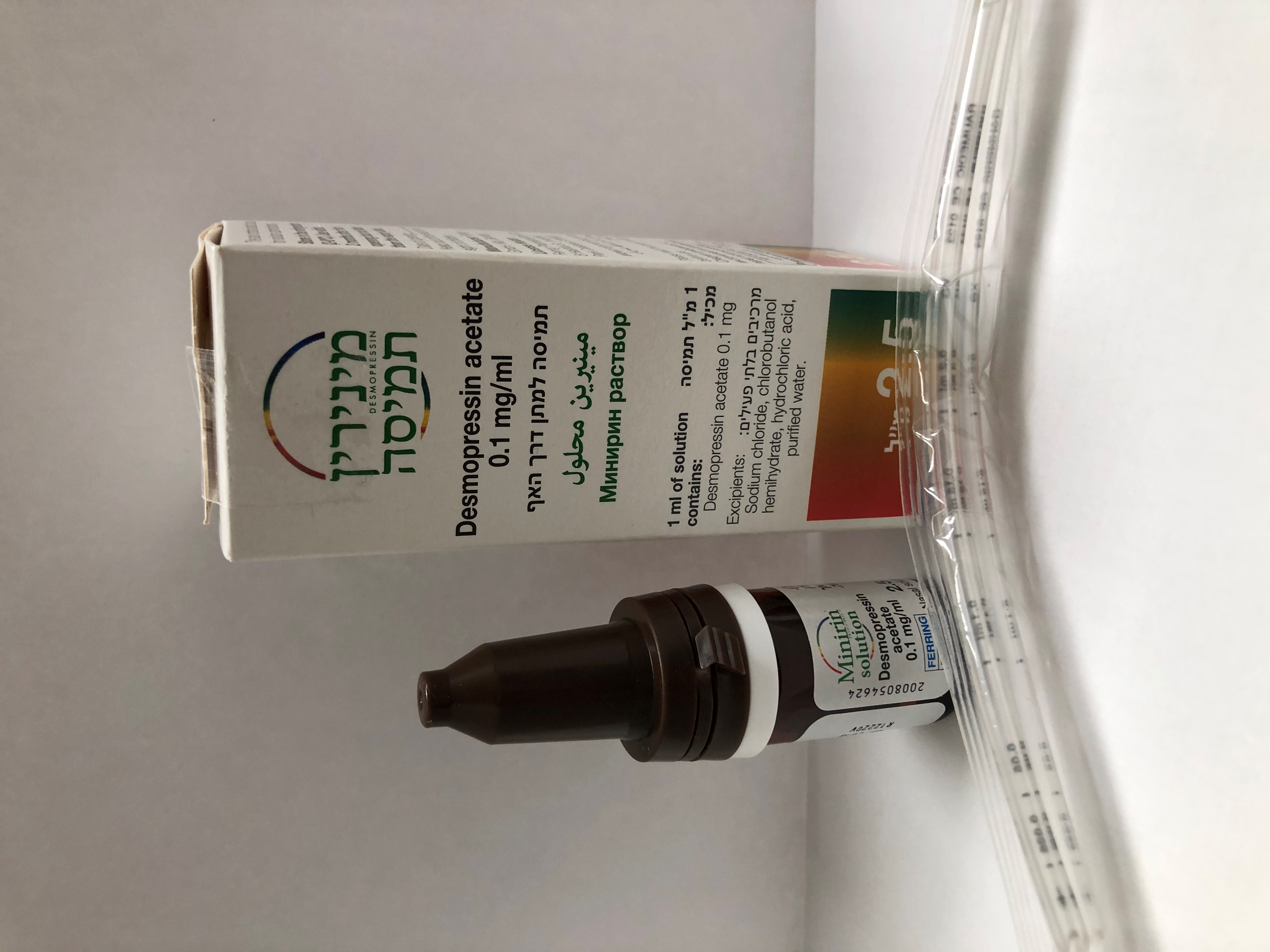Quest for the right Drug

מינירין תמיסה MINIRIN SOLUTION (DESMOPRESSIN ACETATE)
תרופה במרשם
תרופה בסל
נרקוטיקה
ציטוטוקסיקה
צורת מתן:
אפי : NASAL
צורת מינון:
תמיסה לאף : NASAL SOLUTION
עלון לרופא
מינוניםPosology התוויות
Indications תופעות לוואי
Adverse reactions התוויות נגד
Contraindications אינטראקציות
Interactions מינון יתר
Overdose הריון/הנקה
Pregnancy & Lactation אוכלוסיות מיוחדות
Special populations תכונות פרמקולוגיות
Pharmacological properties מידע רוקחי
Pharmaceutical particulars אזהרת שימוש
Special Warning עלון לרופא
Physicians Leaflet
Adverse reactions : תופעות לוואי
4.8 UNDESIRABLE EFFECTS Summary of the safety profile The most serious adverse reaction with desmopressin is hyponatraemia, which may cause headache, nausea, vomiting, decreased serum sodium, weight increase, malaise, abdominal pain, muscle cramps, dizziness, confusion, decreased consciousness and in severe cases convulsions and coma. The majority of other events are reported as non-serious. The most commonly reported adverse reactions during treatment were nasal congestion (27%), high body temperature (15%), and rhinitis (12%). Other common adverse reactions were headache (9%), upper respiratory tract infection (9%), gastroenteritis (7%), abdominal pain (5%). Anaphylactic reactions have not been seen in clinical trials but spontaneous reports have been received. Tabulated summary of adverse reactions: The below table is based on the frequency of adverse drug reactions reported in clinical trials with nasal desmopressin, conducted in children and adults for treatment of CDI, PNE and RCCT (N=745), combined with the post-marketing experience for all indications. Reactions only seen in post- marketing or in other desmopressin formulations have been added in the ‘Not known’ frequency column. MedDRA Organ Very common Common (≥1/100 Uncommon Not known Class (≥1/10) to <1/10) (≥1/1,000 to <1/100) Immune system Allergic reaction disorders Metabolism and Hyponatraemia Dehydration*** nutrition disorders Psychiatric Insomnia, Affect Confusional state* disorders lability**, Nightmare**, Nervousness**, Aggression** Nervous system Headache* Convulsions*, disorders Coma*, Dizziness*, Somnolence Vascular disorders Hypertension Respiratory, Nasal congestion, Epistaxis, Upper Dyspnoea thoracic and Rhinitis respiratory tract mediastinal infection ** disorders Gastrointestinal Gastroenteritis, Vomiting* Diarrhoea disorders Nausea*, Abdominal pain* Skin and Pruritus, Rash, subcutaneous Urticaria tissue disorders Musculoskeletal Muscle spasms* and connective tissue disorders General disorders Fatigue*, and administration Peripheral site conditions oedema*, Chest pain, Chills Investigations Body temperature Weight increased* increased** * Reported in connection with hyponatraemia **Reported primarily in children and adolescents ***Reported in the CDI indication Description of selected adverse reactions: The most serious adverse reaction with desmopressin is hyponatraemia, and in severe cases its complications, i.e. convulsions and coma. The cause of the potential hyponatraemia is the anticipated antidiuretic effect. Paediatric population: The hyponatraemia is reversible and in children it is often seen to occur in relation to changes in daily routines affecting fluid intake and/or perspiration. In children special attention should be paid to the precautions addressed in section 4.4. Other special populations: Infants, elderly and patients with serum sodium levels in the lower range of normal may have an increased risk of developing hyponatraemia (see section 4.4). Reporting of suspected adverse reactions Reporting suspected adverse reactions after authorisation of the medicinal product is important. It allows continued monitoring of the benefit/risk balance of the medicinal product. Healthcare professionals are asked to report any suspected adverse reactions. Any suspected adverse events should be reported to the Ministry of Health according to the National Regulation by using an online form https://sideeffects.health.gov.il/

שימוש לפי פנקס קופ''ח כללית 1994
Short term treatment of primary nocturnal enuresis (patients over 5 years who have the ability to concentrate urine)
תאריך הכללה מקורי בסל
01/01/1995
הגבלות
תרופה שאושרה לשימוש כללי בקופ'ח
מידע נוסף
